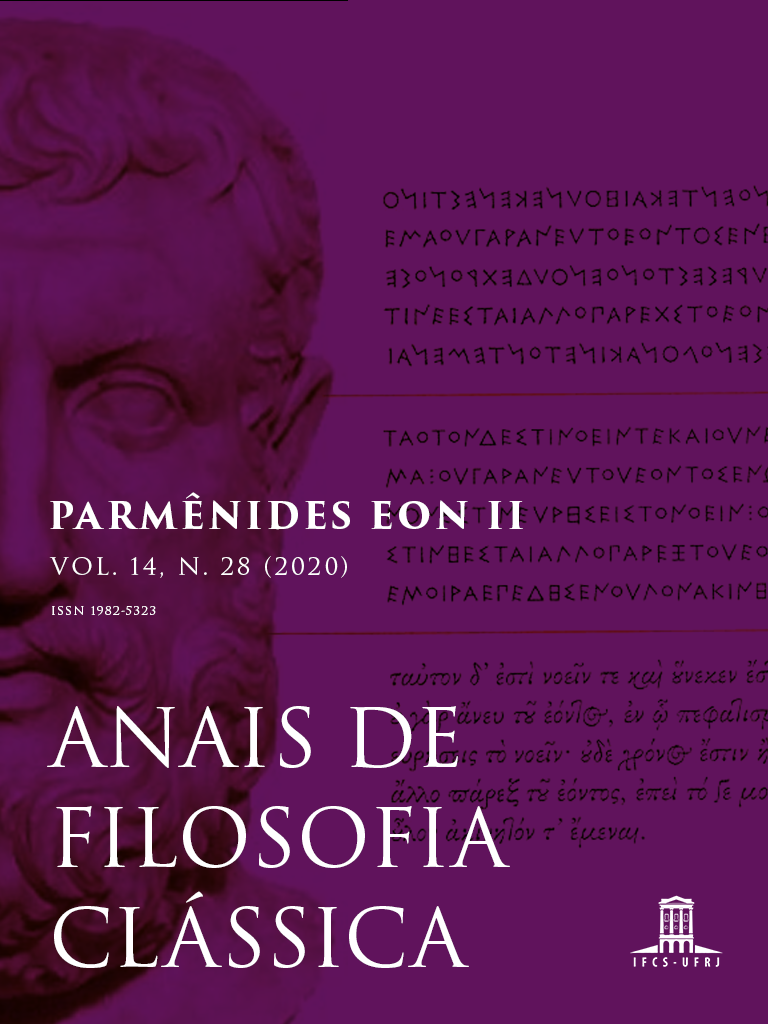The Metaphysics of Parmenides' Doxa and Its Influence
DOI:
https://doi.org/10.47661/afcl.v14i28.38783Palabras clave:
Parménides, Presocráticos, Metafísica, Ciencias.Resumen
La Aletheia de Parménides ha sido estudiada al fondo por los filósofos. Su Doxa, al contrario, se seule desatender, especialmente en los estudios de la metafísica. Pero es ésta la que ocupa la mayoria del poema y ha ejercido la mayor influencia sobre la filosofía posterior. La Doxa parece ejemplificar las propiedades eleáticas que Parménides atribuye al objeto apropiado del entendimiento, al menos hasta donde sea posible en una teoría que pretende explicar el cambio. Por lo visto, intenta explicar, por primera vez, los fenómenos variables por medio de principios invariables. Los principios de la Doxa ofrecieron un modelo para las filosofías posteriores de la naturaleza, y proporcionaron una base para las teorías de los elementos desde el quinto siglo a.C. hasta el presente.Citas
Barnes, J., The Presocratic Philosophers, revised edn. (London: Routledge & Kegan Paul, 1982).
Burkert, W., "Das Proömium des Parmenides und die Katabasis des Pythagoras," Phronesis 14 (1969) 1-30.
Crowley, T.J., "On the Use of Stoicheion in the Sense of 'Element'," Oxford Studies in Ancient Philosophy, 29 (2005) 367-394.
Curd, P., The Legacy of Parmenides, Princeton University Press, 1998.
Diels, H., Doxographi graeci (1879; repr.: Berlin: Walter de Gruyter, 1976).
-----, Elementum: Eine Vorarbeit zum griechischen und lateinischen Thesaurus (Leipzig: B.G. Teubner, 1899).
Furth, M. "Elements of Eleatic Ontology," JHPh 6 (1968): 111-132.
Graham, D.W., "A Testimony of Anaximenes in Plato," CQ 53 (2003) 327-337.
-----, Explaining the Cosmos: The Ionian Tradition of Scientific Philosophy (Princeton: Princeton University Press, 2006).
-----, "Heraclitus and Parmenides," in V. Caston and D.W. Graham (eds.) Presocratic Philosophy: Essays in Honour of Alexander Mourelatos (Aldershot: Ashgate, 2002) 27.
-----, "Heraclitus' Criticism of Ionian Philosophy," OSAPh 15 (1997) 1-50.
-----, "Leucippus's Atomism." P. Curd and D.W. Graham (eds.), The Oxford Handbook of Presocratic Philosophy (Oxford: Oxford University Press, 2008) 333-352.
-----, Science before Socrates: Parmenides, Anaxagoras, and the New Astronomy (Oxford: Oxford University Press, 2013).
-----, The Texts of Early Greek Philosophy (Cambridge: Cambridge University Press, 2010).
Guthrie, W.K.C., A History of Greek Philosophy, vol. 2: The Presocratic Tradition from Parmenides to Democritus (Cambridge: Cambridge University Press, 1965).
Heidel, W. A., "Peri physeos: A Study of the Conception of Nature among the Pre-Socratics," Proceedings of the American Academy of Arts and Sciences 45 (1910) 81-133.
Heath, T.L., Greek Astronomy (London: Dent: 1932).
Hunger, H. and Pingree, D. Astral Sciences in Mesopotamia (Leiden:Brill, 1999).
Kahn, C.H., Anaximander and the Origins of Greek Cosmology (New York: Columbia University Press, 1960; repr. Indianapolis: Hackett, 1994).
Kirk, G. S. et al., The Presocratic Philosophers, 2nd edn. (Cambridge: Cambridge University Press, 1983).
Koller, H., "Stoicheion," Glotta 34 (1955) 161-174.
Lumpe, A., "Der Begriff 'Element' im Altertum," ABG 7 (1962) 285-293.
Mourelatos, A.P.D., "Quality, Structure, and Emergence in Later Pre-Socratic Philosophy," Proceedings of the Boston Area Colloquium in Ancient Philosophy 2 (1987) 127-194.
-----, The Route of Parmenides, revised and expanded edn. (Las Vegas: Parmenides Publishing, 2008).
Naddaf, G., The Greek Concept of Nature (Albany: State University of New York Press, 2005).
Owen, G.E.L. "Eleatic Questions," CQ N.S. 10 (1960) 84-102.
Palmer, J., Parmenides and Presocratic Philosophy (Oxford: Oxford University Press, 2009).
Reiner, E. and Pingree, D., Babylonian Planetary Omens, Part 1: Enuma Anu Enlil, Tablet 63, (Malibu: Undena Publications, 1975).
Schwabe, W., 'Mischung' und 'Element' im Griechischen bis Platon (Bonn: Bouvier Verlag, 1980).
Stokes, M.C., One and Many in Presocratic Philosophy (Washington, D.C.: Center for Hellenic Studies, 1971).
Vollgraff, W., "Elementum," Mnemosyne 4 (1949) 89-115.


